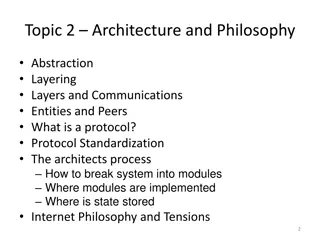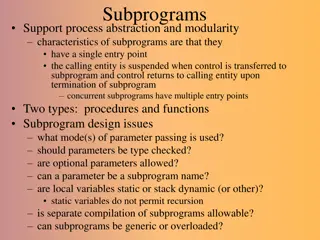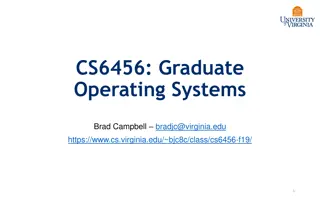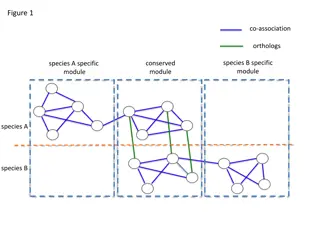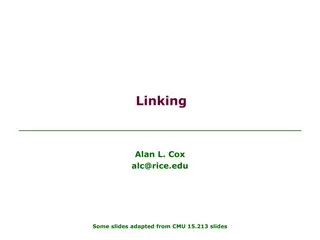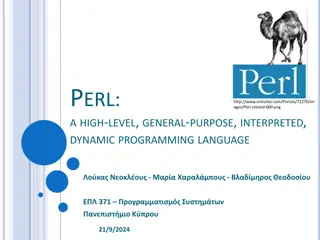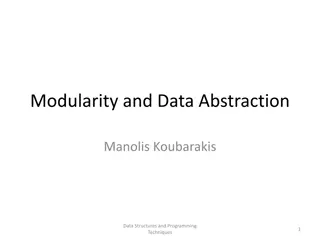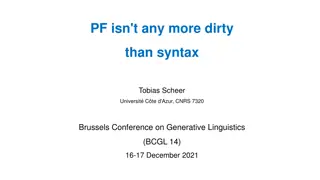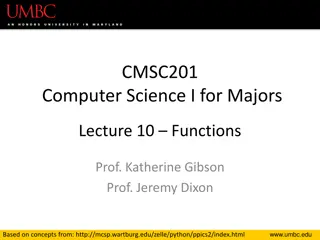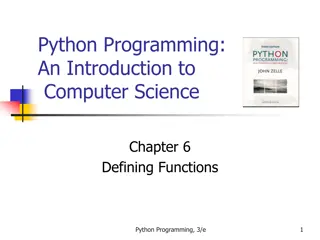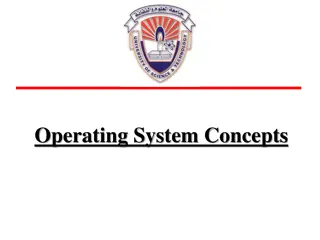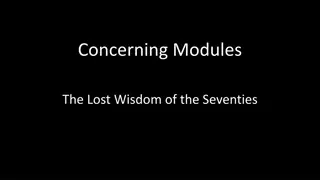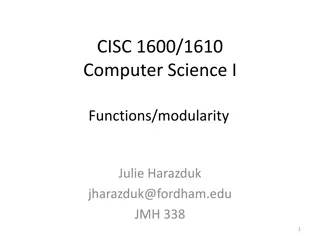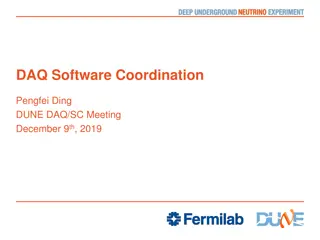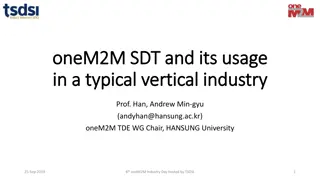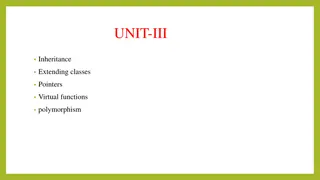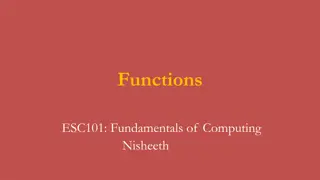Evolution of Test Automation from Slow & Weak to Fast, Flaky, Blind to Smart & Effective
Test automation has evolved over the years, with goals shifting from faster execution and repeatable results to embracing unit testing and automation for more modularity and efficiency. Challenges and achievements in test automation demonstrate the progress towards smarter and more effective testing
1 views • 37 slides
Understanding System Modularity and Layering in Architecture and Philosophy
Explore the concepts of abstraction, layering, and protocol in computer systems. Learn how to break down systems into modules, where state is stored, and the importance of standardization. Delve into the implications of modularity in computer and network systems, highlighting the balance between fle
0 views • 42 slides
Overview of Subprograms in Software Development
Subprograms in software development provide a means for abstraction and modularity, with characteristics like single entry points, suspension of calling entities, and return of control upon termination. They encompass procedures and functions, raising design considerations such as parameter passing
4 views • 25 slides
Understanding Transport Layer Security (TLS)
The lecture discusses key security properties essential for secure communication in computer networks, such as confidentiality, integrity, authentication, and non-repudiation. It elaborates on cryptographic mechanisms for achieving these properties and emphasizes modularity and reusability in implem
1 views • 26 slides
Organizing Operating Systems for Efficiency and Reliability
Operating systems are complex and constantly evolving, with the challenge of managing bugs to ensure smooth operation. Different system structures such as monolithic, layered, and microkernel-based systems offer varying levels of organization and fault tolerance. Microkernel systems, exemplified by
0 views • 31 slides
Carnot Cycle and Multi-Source Engine Characteristics
Carnot cycle is a thermodynamic process converting thermal energy into work, while a multi-source engine offers high efficiency, better reliability, and easier maintenance. It can run on various heat sources and is safe, modular, and flexible. The engine's mechanisms are simpler and suitable for low
11 views • 19 slides
Reactor: A Case for Predictable, Virtualized Actor Database Systems
Exploring the integration of actor programming models in modern relational databases to achieve high performance. The focus is on addressing challenges related to stored procedures, data partitioning, modularity, isolation, software engineering, and performance. The talk outlines motivation, the rel
0 views • 41 slides
Comparative Genomics Analysis of Co-Association Networks in Species A and B
Explore Figures 1 through 5 depicting a novel method for identifying co-association networks of orthologs between species A and B. The analysis includes optimizing a cost function through simulated annealing, identifying cross-species modules, and assessing network modularity with respect to GO refe
1 views • 17 slides
Understanding Object-Oriented Programming (OOP) in Python
Object-Oriented Programming (OOP) is a programming paradigm that focuses on organizing code into objects with attributes and behaviors. Python supports various OOP concepts such as classes, objects, inheritance, polymorphism, abstraction, and encapsulation. Classes serve as blueprints for creating o
0 views • 29 slides
Understanding Linking in C Programming
Learn about the importance of linking in C programming, including memory allocation, modularity, and avoiding errors. Explore how linking combines code into executable files and enables the use of shared libraries, with insights into compilation processes and language scoping rules.
0 views • 59 slides
ISPYB: Advancements in MX Data Management
ISPYB plays a crucial role in MX experiments, supporting collaborative projects with over 1K datasets annually. The current state, demand for functionalities, and comparisons between different MX processes highlight the significance of ISPYB in managing data effectively. Development plans emphasizin
0 views • 8 slides
Introduction to Perl Programming Language
Perl is a high-level, general-purpose, interpreted, dynamic programming language created by Larry Wall. It is known for its practical extraction and reporting capabilities, robust shell scripting, and support for CGI scripts. Perl is celebrated for its modularity, case-sensitivity, and extensive lib
0 views • 27 slides
Understanding Functions in Programming Languages
Functions in programming serve as blocks of computation that allow for code reusability and organization. They enable modularity and help simplify complex tasks by breaking them down into smaller, manageable parts. This article explores the significance of functions in programming through examples i
0 views • 8 slides
Understanding Modularity and Data Abstraction in Programming
Learn about the importance of procedural abstraction, information hiding, modules, and abstract datatypes in programming. Discover how these concepts help in structuring large programs, improving maintainability, and enhancing data organization and operation control.
0 views • 56 slides
Exploring Minimalism in Linguistics: Dirty PF and Clean Syntax
This text delves into the relationship between syntax and PF (Phonological Form) in the context of minimalism theory in linguistics. It discusses how minimalism aims to achieve clean syntax by discarding imperfect elements, with PF often considered as "dirty" due to its association with phonology. T
0 views • 40 slides
Understanding Functions in Programming
Functions play a crucial role in programming by enabling modularity, code sharing, and top-down design approach. This content covers the definition, manipulation, naming conventions, types, and examples of functions in programming, along with insights from Dr. Soha S. Zaghloul.
0 views • 25 slides
Understanding Functions in Computer Science I for Majors Lecture 10
Expanding on the importance of functions in programming, this lecture delves into dividing code into smaller, specific pieces, defining functions in Python, understanding function calls and parameter passing, and using functions to enhance code modularity. Key topics covered include control structur
0 views • 62 slides
Introduction to Defining Functions in Python Programming
Understanding the importance of functions in Python programming, this chapter delves into defining new functions, function calls, and parameter passing. Functions help reduce code duplication, increase program modularity, and enhance program readability and maintenance. By creating named sequences o
0 views • 80 slides
Interprocess Communication in Operating Systems
In operating systems, processes may execute independently or cooperatively, affecting or being affected by other processes. Interprocess communication allows processes to share data and information for reasons like information sharing, computation speedup, modularity, and convenience. There are two
0 views • 22 slides
Understanding Design Patterns in Object-Oriented Design
Design patterns in object-oriented design (OOD) are essential templates that codify best practices for solving common problems. They help streamline development by capturing proven design decisions, promoting code reuse, and enhancing system flexibility and modularity. Learn about the core concepts,
0 views • 20 slides
Insights from NATO Software Engineering Conferences and The Software Crisis of the Seventies
Exploring the challenges faced in software engineering during the 1970s, including issues such as project delays, inefficiencies, and the critical need for reliable, high-quality software. Insights from the NATO Software Engineering Conferences shed light on the struggle to meet increasing modern so
0 views • 46 slides
Understanding BCube Network Architecture for Data Centers
BCube is a high-performance, server-centric network architecture designed for modular data centers. The architecture includes multiple levels, ports, and NICs to enable efficient data transfer and management. BCube offers benefits such as modularity, source routing, commodity switches, high capacity
0 views • 9 slides
Mastering C++ Functions and Modularity with Example Programs
Learn how to effectively use functions in C++, including how to declare variables, control flow using if-else statements and loops, and create blocks of statements. Dive into the concept of functions, pre-defined functions, and practical applications like the Pythagorean Theorem calculation in C++.
0 views • 67 slides
Desired Features of a Software Build System for DUNE DAQ
Discussion on the desired features of a software build system for DUNE DAQ, including creating C++ builds, supporting multiple languages, handling multiple software versions, efficient change management, easy installation processes, modularity, and more. The aim is to streamline the software develop
0 views • 9 slides
Understanding SDT in oneM2M: Device Modeling for Vertical Industries
SDT (Smart Device Template) in oneM2M plays a crucial role in standardizing device modeling across various industry alliances. It aims to simplify the process for manufacturers, ensure modularity, facilitate API development, and allow for extendibility without service disruption. This overview cover
0 views • 18 slides
Understanding Inheritance in Object-Oriented Programming
Inheritance allows a class to inherit properties and characteristics from another class, promoting code reusability and reducing duplication. It is a fundamental feature in Object-Oriented Programming that enhances modularity and scalability by structuring classes hierarchically. Different modes and
0 views • 50 slides
Enforcing Modularity with Domains in Thread Management
Exploring the concept of domains in thread management to enforce modularity and prevent threads from accessing memory outside their designated ranges. By allocating threads to specific domains and using memory managers, we can enhance security and stability in software systems, particularly in scena
0 views • 26 slides
Understanding Functions in C Programming
Functions play a crucial role in C programming, allowing for modularity and reusability of code. This content covers the basics of functions, creating custom functions, passing arguments, returning values, and the anatomy of a C function. Learn about defining functions, passing arguments effectively
0 views • 24 slides

